Nothing special, just history, drawings of historical figures in some… er… non-canonical relationships and fun! 🥂25 year old RussianHe/him
Don't wanna be here? Send us removal request.
Text
be kind to historians. they do a thankless job, digging through layers and layers of artifacts, letters, and dates, only to be told that their work is not as important as others’. their paper-cut hands don’t seem impressive to most, the sign of the leisurely scholar. but they carry the burden of mankind’s memory- shepherds of souls, they rescue the lost from lethe’s devouring streams. the doctor may scoff, the engineer laugh, the physicist sneer. yet no one has found immortality’s secret except the historians, who delve into textbooks and bring people back to life.
be kind to historians. they are a sensitive, though not fragile, sort. they have wept for those whom they can never meet, for those who have been dust for centuries before our time. in some ways these lives are meaningless to them, vague shadows of people who once walked upon the earth, perhaps something like the people we know them as, perhaps not. time snatches some details away, corrupts others. but the historians collect them all and say, you were a person once. let us get know you as best as we can.
be kind to historians. they are, as schlegel once wrote, like prophets in reverse. they cannot predict the future, not exactly; their knowledge is of the past. but unlike normal prophets, historians can explain their myriad visions. old happenings become not whats and whens but whys, and the historians tell us their tales of the past with an eye toward the future. they cannot exactly say what will happen, but they warn us of what might, looking where nobody else will to keep us as safe as they can.
yes, be kind to historians. because they are kind to us.
4K notes
·
View notes
Text
Hamlet starring Gustaf Gründgens


Gründgens was the first German actor to show Hamlet as a warrior and fighter, rather than as an indecisive little boy. I like it.
#yessss the brain damage we have because of this man#history#art#theatre#hamlet#gustaf gründgens#germany#20th century
26 notes
·
View notes
Text






disfunctional coalitions and sad girls or smth
#always a joy to see your magnificent artwork 🤲❤️#history#art#napoleonic era#napoleonic wars#19th century
77 notes
·
View notes
Text
The latest reenactment also granted me a gift by the hands of an exceptionally talented person who made wonderful photos of me in the “historical” garments I wear at events as such.
I’m definitely not a big fan of military life-style and discipline in an actual reenactment camp. And since there aren’t much people in civilian attires from the respective time period (they are present nonetheless), I’m glad to participate and fill up the ranks! 🎩


Unfortunately, sewing skills were never my forte, so the most important pieces of the attire were made by a professional seamstress who has a lot of experience in historical clothings. The garments aren’t perfect - far from it: I myself couldn’t properly track all the things that had to be done or mended, so it is what it is. But the colours I chose seem not bad at all. 💙🩷
(And yes, when it came to camera angles, we took direct inspiration from Caspar David Friedrich - how could we not, when the scenery was perfect for that!)
***
There’re also these close-up photos I took spontaneously which I really like despite them being a bit messy and imperfect.
What a shame for a proper Austrian gentleman on duty among the French troops! 🤫


#count’s private life#napoleonic fashion#history#reenactment#historical reenactment#napoleonic era#napoleonic wars#19th century#romanticism
74 notes
·
View notes
Text
Some more Borodino photos (and a video) I managed to sort out. ❤️💙
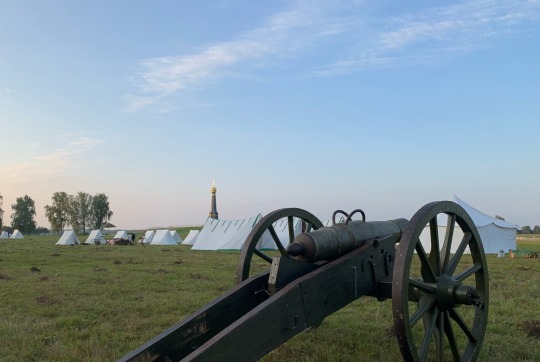
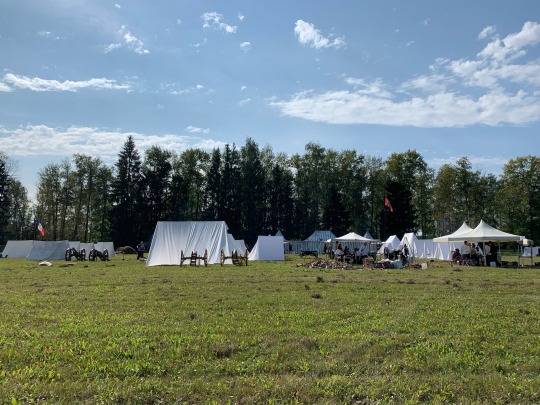
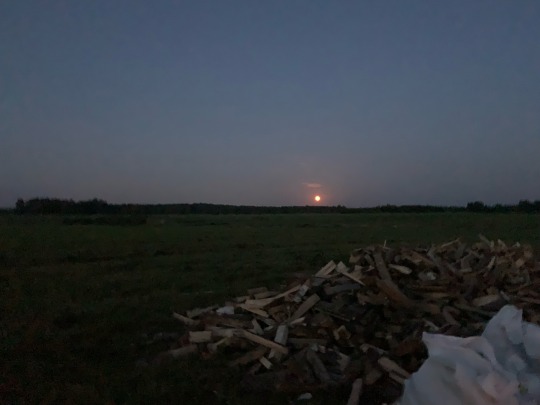
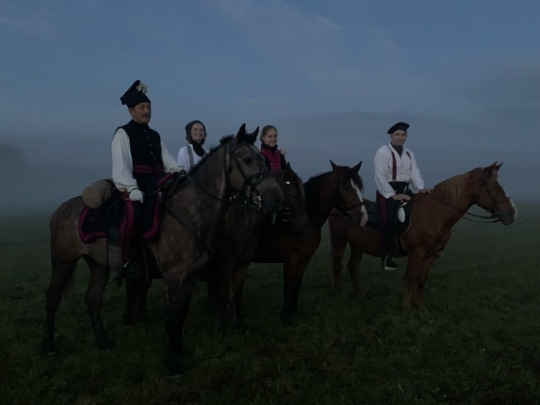
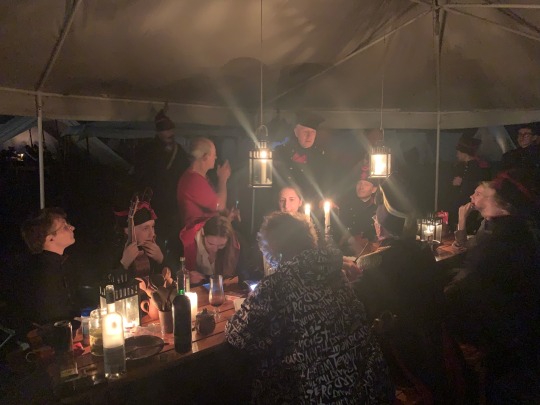
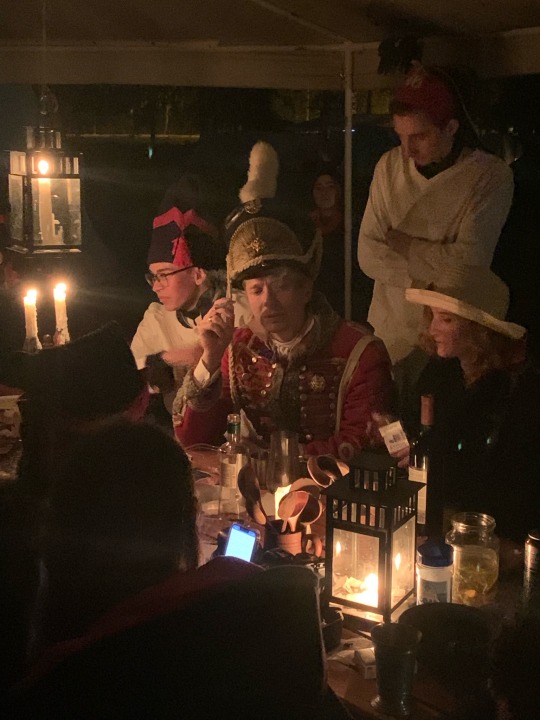
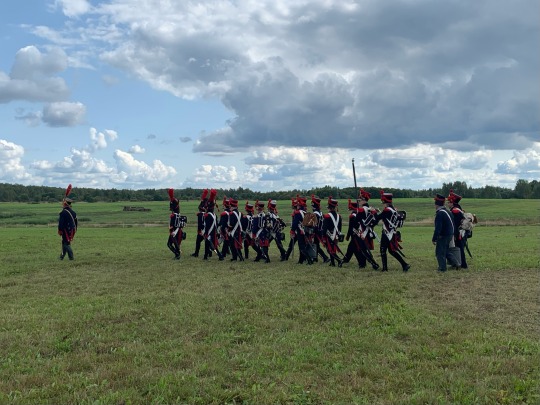
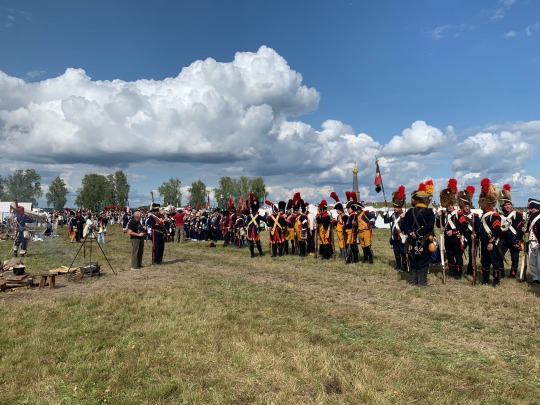
#history#reenactment#historical reenactment#borodino#the battle of borodino#napoleonic era#napoleonic wars#the war of 1812#19th century
89 notes
·
View notes
Text
Annual visit to the Borodino field was quite pleasant this year because of extremely mild weather - with the sole exception of a day, when it was raining cats and dogs…
However, unfortunate circumstances sometimes have a bright side too. In this case the rain in the afternoon caused thick fog to appear at dusk which turned the whole landscape into a majestic dream. 🌅
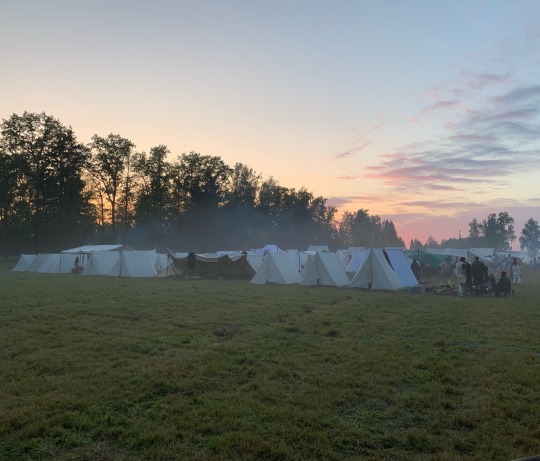
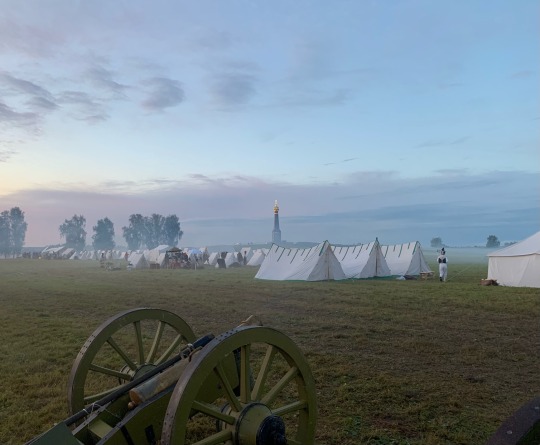
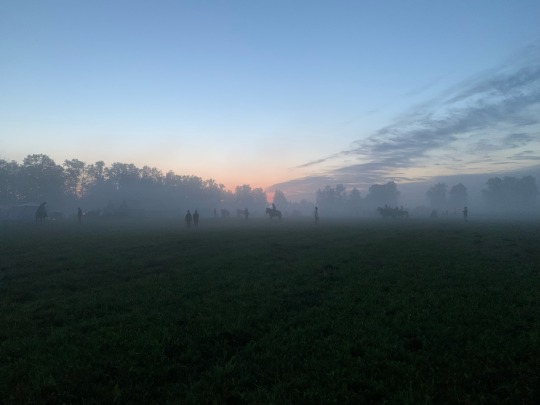
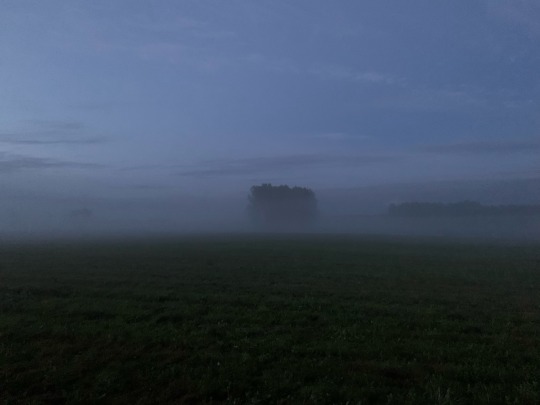
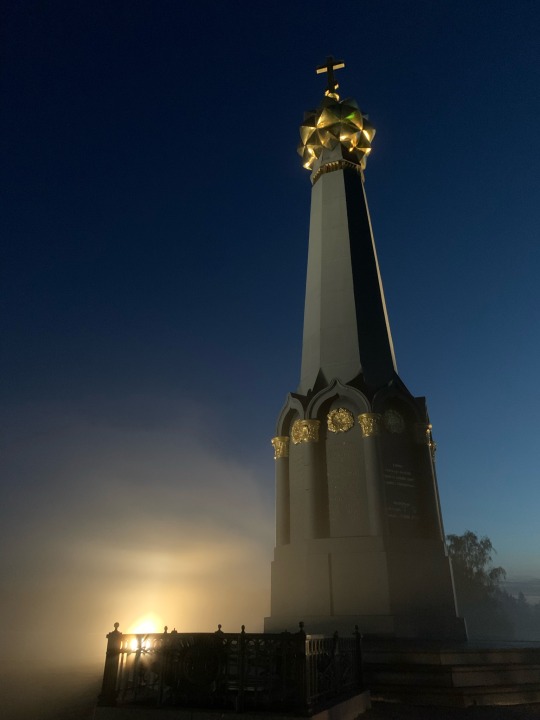
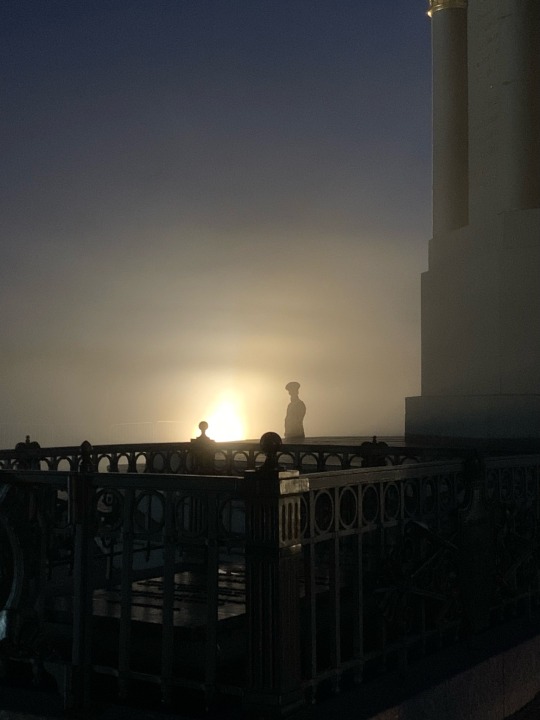
#count’s private life#history#reenactment#historical reenactment#borodino#the battle of borodino#napoleonic era#napoleonic wars#russian empire#premier empire#the war of 1812#19th century
47 notes
·
View notes
Text
Farewell to the Dnieper

59 notes
·
View notes
Text


Something’s cooking - slowly but surely. ✨
20 notes
·
View notes
Text
Wow, people are really talking about all of Metternich’s love affairs, haha!
It seems, this topic tends to reoccur once in a while and it’s quite fascinating to observe, what others have to say or create based on the subject. Such as excellent memes! 😁
*Laure and Jean-Andoche Junot definitely have to make an appearance as well ✨*

This needed to be done after the very nice conversation about Bagration I had with @galakteon and @peachboy0101001
#napoleonic memes#klemens von metternich#pyotr bagration#napoleonic era#napoleonic wars#19th century
98 notes
·
View notes
Text
So, it was my birthday yesterday but I had no time to go on the Internet due to having too much fun. Still I’d appreciate reposts of some of my most favourite artwork as I am a drawing person after all. :)






I don’t finish as much pieces as I once could, yet the process is always captivating. ❤️
41 notes
·
View notes
Text
Grandpa’s gift
There is an incredibly fascinating artistic detail that haunts me after some person posted their astute observations on the Internet and I would love to share it with you!
So, we have this illustration from a book “Life of Napoleon Bonaparte” by William Milligan Sloane (1896). Here we can see Napoleon visiting his son in a timeframe close to spring of 1813, when it became obvious that his larger political allies proved to be good for nothing and were probably going to leave him soon. Napoleon is shown deep in his thoughts holding a hand of his beloved son and looking at something far beyond our reach…
Or is he?
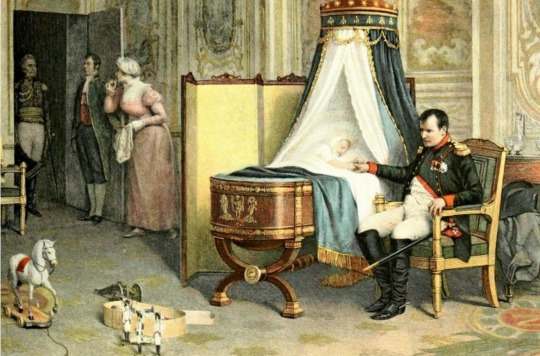
Speculations can be made that he actually has his attention on the toy soldiers present in a foreground of the picture.
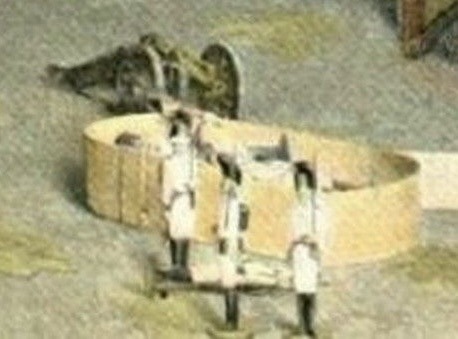
While a cannon can be more than rightfully considered Napoleon’s own symbol, these toy soldiers do not represent any French troops. It’s possible to discern their tall hats but those are not bear hats of the Old guard, for sure.
They probably are the hats of Imperial (Austrian) grenadiers from the period of the Revolutionary wars. You can even notice red lining and cuffs being parts of their snowy-white coats.

Even if it was somewhat of a tradition to gift toy soldiers representing military units of relatively “old times”, an air of symbolism may also surround such a choice of troops. You know, that symbolism straight from those times when Imperial forces hadn’t yet suffered critical blows from the renewed French army and thought of themselves as fighters for truth and Habsburg’s justice.
So yeah. What a meaningful gift from a caring grandfather to his grandson it could be~ 🤭
(I’m also able to imagine how prince Schwarzenberg himself could have delivered this exact gift to Marie Louise, when he came to Paris as a diplomat once more and it literally gives me goose bumps. I love such small but significant imaginary plots with all my heart. ❤️)
#napoleonic aesthetic#napoleon i#napoleon ii#napoleon bonaparte#l’aiglion#franz ii of austria#napoleonic era#napoleonic wars#premier empire#austrian empire#19th century
52 notes
·
View notes
Photo

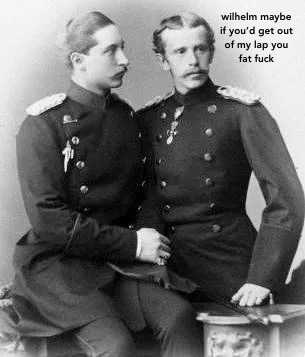
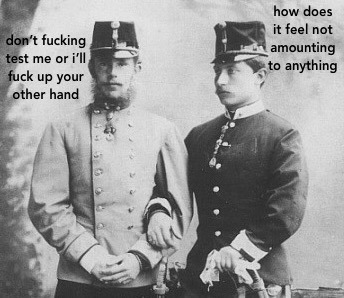

Awkward family photos but it’s Crown Prince Rudolf of Austria-Hungary and Wilhelm II of Prussia.
#I’m literally whizzing from these captions it’s illegal#they have an air of such goofy siblings I can’t#kronprinz rudolf#crown prince rudolf of austria#wilhelm ii of germany#austro hungarian empire#german empire#19th century
105 notes
·
View notes
Text
Thank you so much for your commentary, @josefavomjaaga! 🙏
I see… The waring parties at Austrian court strike again!
Klemens used the trump card he thought out at the moment but his actions couldn’t have passed unnoticed by others, as they tried to prevent his “cruel deeds” from coming to life. X)
Good time of day to you, ladies and gentlemen!
So, I made a promise in April that I never kept because of how insecure I felt about it for a long period of time. However, now I’m more than knowledgeable in terms of the subject and ready to full fill with immense pleasure that old pledge of mine. ✨
This post is dedicated to @microcosme11 and @usergreenpixel, since you’ve shown great interest in my proposition in the first place. :)
It all started with the discovery of a film “Hundert Tage” released in the year 1935. Its name speaks for itself as the movie covers Napoleon’s famous return from Elba in 1815 up to the battle of Waterloo. What’s fairly surprising is that Joseph Fouché, notorious ex-minister of police with many other regalia earned through the years of serving many masters, played a significant role in the plot (as he did in real life), despite usually having a somewhat ghostly presence in other pieces of Napoleonic media. In the “Hundert Tage” he is more than an active political player portrayed by Gustaf Gründgens, prominent German theater and film actor with his background being too controversial to ever make a non-biased sense of…
Anyhow, the thing is: the impersonation of Fouché wasn’t the first “Napoleonic” role Gründgens ever tried on during his artistic career. Exactly a year before that another film of Austrian (!) production was made where he starred in a role which suits his appearance and play style so well that I’m still blown away by such an impeccable choice.
The original title of the film is “So Endete eine Liebe” (1934) and it deals with the tragic story of erzherzogin Marie Louise, future wife of emperor Napoleon, being separated from her true love for the sake of an advantageous marriage and political alliance. The film cast is mainly Austro-German with two leading performers being Willi Forst, one of the most prominent Austrian actors in the 20th century, playing archduke Franz von Modena, and fore mentioned Gustaf Gründgens, an actor who was also born in the Westphalian region of Germany, playing… Klemens von Metternich in all his mischievous glory. 💅✨

The film itself is not friendly to people who aren’t ready to face the complexity of Habsburg’s incest-flavoured dramas at their finest (I myself wasn’t aware of the infatuation that Marie-Louise had for her uncle, if it ever took place at all [and I’m too lazy to check any decent biography about her to find out what did happen exactly]). BUT, but Gründgens’ Metternich is something else.
With due awareness and respect. 🧎♂️








This role was made for him, no doubt: even the film and its actors show appreciation for his grace at the first opportunity given. 😁
#historical film#so endete eine liebe#erzherzogin marie louise#klemens von metternich#napoleonic era#napoleonic wars#austrian empire#19th century
31 notes
·
View notes
Text
You’re always welcome! Wish you a pleasant watch. 🤗
I’ve already watched this film more than 5 times - still don’t understand a lot of things, since I’m not fluent in German as well. But I’m definitely going to make more posts about this movie focusing on most brilliant and witty parts from it. :)
Good time of day to you, ladies and gentlemen!
So, I made a promise in April that I never kept because of how insecure I felt about it for a long period of time. However, now I’m more than knowledgeable in terms of the subject and ready to full fill with immense pleasure that old pledge of mine. ✨
This post is dedicated to @microcosme11 and @usergreenpixel, since you’ve shown great interest in my proposition in the first place. :)
It all started with the discovery of a film “Hundert Tage” released in the year 1935. Its name speaks for itself as the movie covers Napoleon’s famous return from Elba in 1815 up to the battle of Waterloo. What’s fairly surprising is that Joseph Fouché, notorious ex-minister of police with many other regalia earned through the years of serving many masters, played a significant role in the plot (as he did in real life), despite usually having a somewhat ghostly presence in other pieces of Napoleonic media. In the “Hundert Tage” he is more than an active political player portrayed by Gustaf Gründgens, prominent German theater and film actor with his background being too controversial to ever make a non-biased sense of…
Anyhow, the thing is: the impersonation of Fouché wasn’t the first “Napoleonic” role Gründgens ever tried on during his artistic career. Exactly a year before that another film of Austrian (!) production was made where he starred in a role which suits his appearance and play style so well that I’m still blown away by such an impeccable choice.
The original title of the film is “So Endete eine Liebe” (1934) and it deals with the tragic story of erzherzogin Marie Louise, future wife of emperor Napoleon, being separated from her true love for the sake of an advantageous marriage and political alliance. The film cast is mainly Austro-German with two leading performers being Willi Forst, one of the most prominent Austrian actors in the 20th century, playing archduke Franz von Modena, and fore mentioned Gustaf Gründgens, an actor who was also born in the Westphalian region of Germany, playing… Klemens von Metternich in all his mischievous glory. 💅✨

The film itself is not friendly to people who aren’t ready to face the complexity of Habsburg’s incest-flavoured dramas at their finest (I myself wasn’t aware of the infatuation that Marie-Louise had for her uncle, if it ever took place at all [and I’m too lazy to check any decent biography about her to find out what did happen exactly]). BUT, but Gründgens’ Metternich is something else.
With due awareness and respect. 🧎♂️








This role was made for him, no doubt: even the film and its actors show appreciation for his grace at the first opportunity given. 😁
#historical film#so endete eine liebe#klemens von metternich#austrian empire#19th century#20th century
31 notes
·
View notes
Text
Good time of day to you, ladies and gentlemen!
So, I made a promise in April that I never kept because of how insecure I felt about it for a long period of time. However, now I’m more than knowledgeable in terms of the subject and ready to full fill with immense pleasure that old pledge of mine. ✨
This post is dedicated to @microcosme11 and @usergreenpixel, since you’ve shown great interest in my proposition in the first place. :)
It all started with the discovery of a film “Hundert Tage” released in the year 1935. Its name speaks for itself as the movie covers Napoleon’s famous return from Elba in 1815 up to the battle of Waterloo. What’s fairly surprising is that Joseph Fouché, notorious ex-minister of police with many other regalia earned through the years of serving many masters, played a significant role in the plot (as he did in real life), despite usually having a somewhat ghostly presence in other pieces of Napoleonic media. In the “Hundert Tage” he is more than an active political player portrayed by Gustaf Gründgens, prominent German theater and film actor with his background being too controversial to ever make a non-biased sense of…
Anyhow, the thing is: the impersonation of Fouché wasn’t the first “Napoleonic” role Gründgens ever tried on during his artistic career. Exactly a year before that another film of Austrian (!) production was made where he starred in a role which suits his appearance and play style so well that I’m still blown away by such an impeccable choice.
The original title of the film is “So Endete eine Liebe” (1934) and it deals with the tragic story of erzherzogin Marie Louise, future wife of emperor Napoleon, being separated from her true love for the sake of an advantageous marriage and political alliance. The film cast is mainly Austro-German with two leading performers being Willi Forst, one of the most prominent Austrian actors in the 20th century, playing archduke Franz von Modena, and fore mentioned Gustaf Gründgens, an actor who was also born in the Westphalian region of Germany, playing… Klemens von Metternich in all his mischievous glory. 💅✨

The film itself is not friendly to people who aren’t ready to face the complexity of Habsburg’s incest-flavoured dramas at their finest (I myself wasn’t aware of the infatuation that Marie-Louise had for her uncle, if it ever took place at all [and I’m too lazy to check any decent biography about her to find out what did happen exactly]). BUT, but Gründgens’ Metternich is something else.
With due awareness and respect. 🧎♂️








This role was made for him, no doubt: even the film and its actors show appreciation for his grace at the first opportunity given. 😁
#cinema#historical film#so endete eine liebe#paula wessely#gustaf gründgens#willi forst#erzherzogin marie-louise#klemens von metternich#erzherzog franz von modena#napoleonic era#napoleonic wars#austrian empire#19th century#20th century
31 notes
·
View notes
Text

I really ship it
I am very inspired by their hatred and respect for each other 🙏🏻
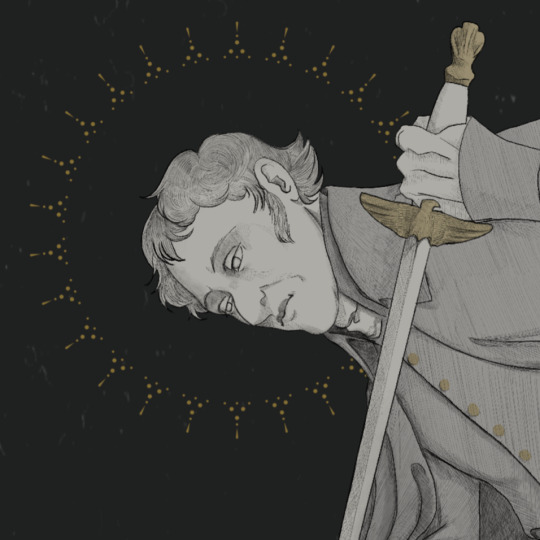

#art#history#michel ney#marshal ney#arthur wellesley#duke of wellington#napoleonic era#napoleonic wars#19 century
96 notes
·
View notes
Text
Pride Month is inevitably coming to an end and it’s a real shame that I was unable to make any artistic input during this wonderful time of the year. 🏳️🌈
The only thing I can contribute at last is this drawing which is three months old already but I always struggle with sharing historical ship-content on this account, as it seems inappropriate in a way. 'Cause you know: all the fascinating/gorgeous/serious/funny historical stuff and then that…
It doesn’t really stop me from loving various Napoleonic rare-pairs with all my heart nonetheless. 😔🤲❤️

Disclaimer: Most of historical characters featured on such arts were undoubtedly straight, had wives, kids, mistresses, etc. But ship-dynamic is very real - as always. ✨
#art#history#count’s drawings#metterberg#klemens von metternich#karl zu schwarzenberg#napoleonic era#napoleonic wars#austrian empire#19th century
27 notes
·
View notes